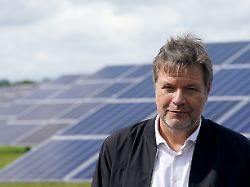Fight against cheap China
Habeck is planning a “resilience bonus” for German solar manufacturers
December 17, 2023, 3:43 p.m
Listen to article
This audio version was artificially generated. More info | Send feedback
The solar industry is booming, but manufacturers in Germany are hardly feeling the impact on their books. Cheap panels from China are in demand; overcapacity there is depressing prices. The household chaos of the traffic light does the rest. Economics Minister Habeck wants to intervene with bonus payments.
Federal Minister of Economics Robert Habeck wants to strengthen German manufacturers of solar panels with a bonus in the competition against low-cost suppliers from China. “Solar products from Germany meet requirements that others do not meet. For example, manufacturers in Germany often do not use toxins or have high levels of efficiency,” said Habeck to the editorial network Germany (RND). “Anyone who makes such a difference and contributes to resilience should be rewarded for it,” the Green politician continued. “That’s why I would like us to enable a pilot tender for some kind of resilience bonus.”
A similar instrument is currently being negotiated at EU level; the trialogue between the European Council, Parliament and the EU Commission on the Net Zero Industry Act (NZIA) is scheduled to start at the beginning of 2024. But Habeck doesn’t want to wait until this is passed: “It’s important that we can now get this done at the national level via the EEG. The solar package that is currently in parliament is an opportunity to implement this now.”
Although the expansion of solar energy is currently booming in Germany, the vast majority of panels come from China, as Habeck complains. “I think it is important that Germany has at least a basic share of its own production. Value creation and jobs should also be created here. And it is also a question of economic security that we are not solely dependent on imports.”
Solar industry is suffering
Overcapacity in China has triggered a brutal price war in the solar industry, which is putting an enormous burden on manufacturers in German-speaking countries. Since the summer, SMA Solar’s share price has almost halved. On the Swiss stock exchange, the shares of the largest German solar cell manufacturer, Meyer Burger, have already lost two thirds of their value since the beginning of the year.
However, the prospects are not only suffering from the favorable competition from China, but also from the budget chaos of the traffic lights: After the Constitutional Court ruling on the Climate and Transformation Fund (KTF), the federal government has to make savings in the new budget – including the 1.3 billion euro budget Solar funding.
In an interview with the RND, Habeck admitted that the federal government’s financial options were limited. “The program has been reduced,” he said, referring to the original subsidy plans in the PV sector. “It’s painful, but we’re working on solutions outside of the Climate and Transformation Fund to improve things.”
Solar cell manufacturer Meyer Burger, meanwhile, believes in Germany as a location despite the cuts and believes it is possible to build up additional production capacity. An increase in production capacity for cells and modules as part of the Federal Ministry of Economics’ expression of interest process is also fundamentally “still planned” in the revised climate and transformation fund, said Meyer Burger boss Gunter Erfurt to the business magazine “Capital”. There are still discussions with the federal government about this. He also referred to the recent funding commitment for Meyer Burger at EU level amounting to 200 million euros. This could potentially compensate for cuts at the national level, he said.
